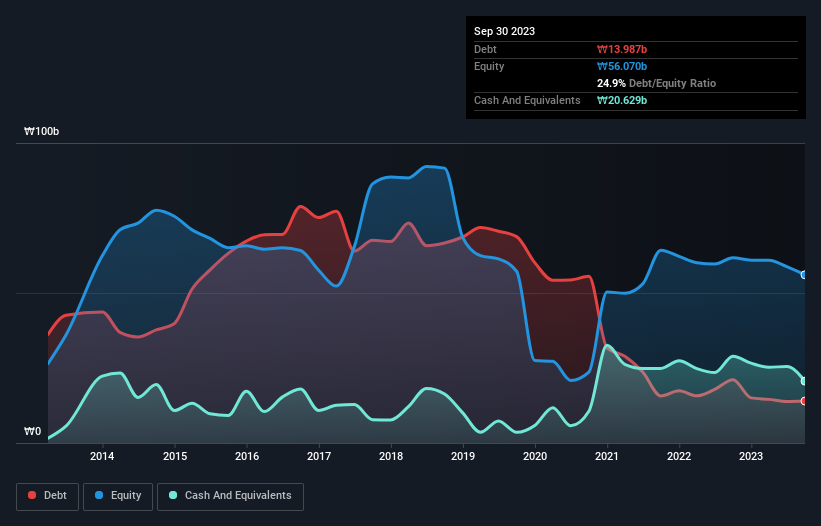- South Korea
- /
- Semiconductors
- /
- KOSDAQ:A049080
Does GIGALANE (KOSDAQ:049080) Have A Healthy Balance Sheet?

Some say volatility, rather than debt, is the best way to think about risk as an investor, but Warren Buffett famously said that 'Volatility is far from synonymous with risk.' So it might be obvious that you need to consider debt, when you think about how risky any given stock is, because too much debt can sink a company. We note that GIGALANE Co., Ltd. (KOSDAQ:049080) does have debt on its balance sheet. But the more important question is: how much risk is that debt creating?
What Risk Does Debt Bring?
Debt and other liabilities become risky for a business when it cannot easily fulfill those obligations, either with free cash flow or by raising capital at an attractive price. Ultimately, if the company can't fulfill its legal obligations to repay debt, shareholders could walk away with nothing. However, a more frequent (but still costly) occurrence is where a company must issue shares at bargain-basement prices, permanently diluting shareholders, just to shore up its balance sheet. By replacing dilution, though, debt can be an extremely good tool for businesses that need capital to invest in growth at high rates of return. When we examine debt levels, we first consider both cash and debt levels, together.
Check out our latest analysis for GIGALANE
What Is GIGALANE's Net Debt?
As you can see below, GIGALANE had ₩14.0b of debt at September 2023, down from ₩21.1b a year prior. But it also has ₩20.6b in cash to offset that, meaning it has ₩6.64b net cash.

How Strong Is GIGALANE's Balance Sheet?
According to the last reported balance sheet, GIGALANE had liabilities of ₩20.1b due within 12 months, and liabilities of ₩6.71b due beyond 12 months. Offsetting this, it had ₩20.6b in cash and ₩8.81b in receivables that were due within 12 months. So it actually has ₩2.60b more liquid assets than total liabilities.
This short term liquidity is a sign that GIGALANE could probably pay off its debt with ease, as its balance sheet is far from stretched. Succinctly put, GIGALANE boasts net cash, so it's fair to say it does not have a heavy debt load! The balance sheet is clearly the area to focus on when you are analysing debt. But it is GIGALANE's earnings that will influence how the balance sheet holds up in the future. So if you're keen to discover more about its earnings, it might be worth checking out this graph of its long term earnings trend.
In the last year GIGALANE had a loss before interest and tax, and actually shrunk its revenue by 8.5%, to ₩49b. We would much prefer see growth.
So How Risky Is GIGALANE?
We have no doubt that loss making companies are, in general, riskier than profitable ones. And we do note that GIGALANE had an earnings before interest and tax (EBIT) loss, over the last year. Indeed, in that time it burnt through ₩7.4b of cash and made a loss of ₩12b. While this does make the company a bit risky, it's important to remember it has net cash of ₩6.64b. That kitty means the company can keep spending for growth for at least two years, at current rates. Even though its balance sheet seems sufficiently liquid, debt always makes us a little nervous if a company doesn't produce free cash flow regularly. The balance sheet is clearly the area to focus on when you are analysing debt. But ultimately, every company can contain risks that exist outside of the balance sheet. Be aware that GIGALANE is showing 2 warning signs in our investment analysis , you should know about...
If you're interested in investing in businesses that can grow profits without the burden of debt, then check out this free list of growing businesses that have net cash on the balance sheet.
New: Manage All Your Stock Portfolios in One Place
We've created the ultimate portfolio companion for stock investors, and it's free.
• Connect an unlimited number of Portfolios and see your total in one currency
• Be alerted to new Warning Signs or Risks via email or mobile
• Track the Fair Value of your stocks
Have feedback on this article? Concerned about the content? Get in touch with us directly. Alternatively, email editorial-team (at) simplywallst.com.
This article by Simply Wall St is general in nature. We provide commentary based on historical data and analyst forecasts only using an unbiased methodology and our articles are not intended to be financial advice. It does not constitute a recommendation to buy or sell any stock, and does not take account of your objectives, or your financial situation. We aim to bring you long-term focused analysis driven by fundamental data. Note that our analysis may not factor in the latest price-sensitive company announcements or qualitative material. Simply Wall St has no position in any stocks mentioned.
About KOSDAQ:A049080
GIGALANELtd
GIGALANE Co., Ltd. primarily manufactures and sells RF mobile communication components and semiconductor equipment in South Korea and internationally.
Flawless balance sheet and slightly overvalued.


